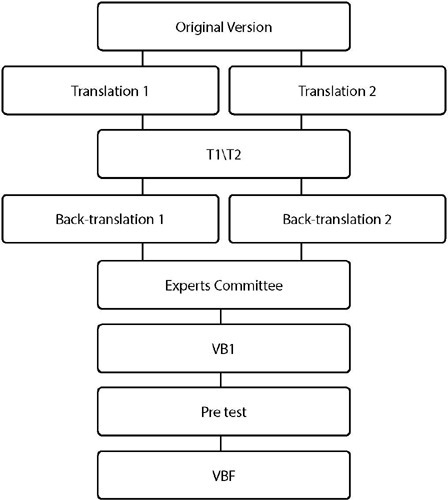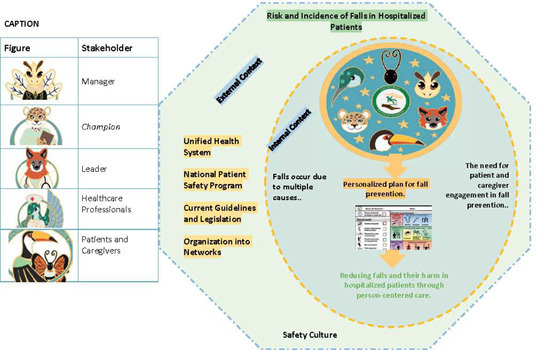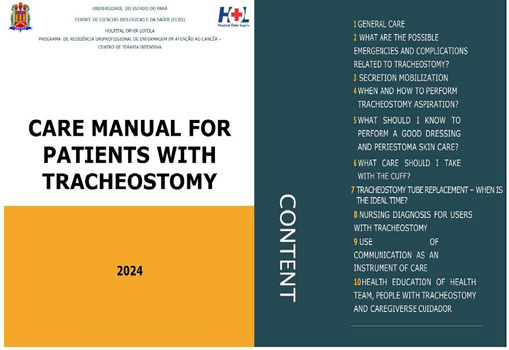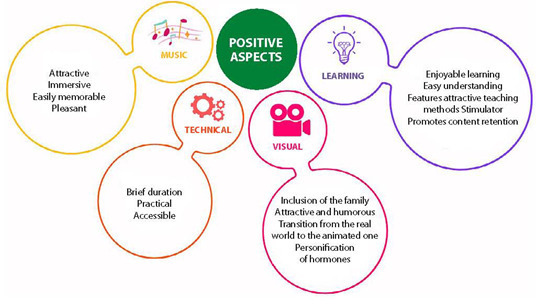-
ORIGINAL ARTICLE06-14-2024
Duração e qualidade do sono da equipe de enfermagem brasileira que trabalha em turnos
Revista Brasileira de Enfermagem. 2024;77(2):e20230167
Abstract
ORIGINAL ARTICLEDuração e qualidade do sono da equipe de enfermagem brasileira que trabalha em turnos
Revista Brasileira de Enfermagem. 2024;77(2):e20230167
DOI 10.1590/0034-7167-2023-0167
Views0See moreRESUMEN
Objetivo:
analizar la duración y calidad del sueño en profesionales de enfermería que trabajan por turnos.
Método:
investigación analítica, transversal, realizada entre septiembre de 2017 y abril de 2018, en un hospital público del sur de Brasil, con el equipo de enfermería. Se utilizó el cuestionario sociolaboral y de síntomas de salud, la Escala de Somnolencia de Epworth y el Índice de Calidad del Sueño de Pittsburgh. Los datos se presentan como estadística descriptiva e inferencial, análisis bivariado y regresión logística binaria.
Resultados:
participaron 308 profesionales de enfermería, con predominio de sueño prolongado, ausencia de somnolencia y mala calidad del sueño. La duración corta del sueño (<6 h) se asoció con turnos de día y mala calidad del sueño. La calidad del sueño se asoció con la presencia de somnolencia diurna excesiva y con el trabajo diurno.
Conclusión:
los turnos de trabajo, el insomnio y la cefalea fueron los principales factores relacionados con la falta de sueño de los profesionales de enfermería. Los resultados pueden justificar el desarrollo de investigaciones de intervención para la salud de los trabajadores.
-
ORIGINAL ARTICLE06-14-2024
Sleep duration and quality of Brazilian nursing staff who work in shifts
Revista Brasileira de Enfermagem. 2024;77(2):e20230167
Abstract
ORIGINAL ARTICLESleep duration and quality of Brazilian nursing staff who work in shifts
Revista Brasileira de Enfermagem. 2024;77(2):e20230167
DOI 10.1590/0034-7167-2023-0167
Views0See moreABSTRACT
Objective:
to analyze sleep duration and sleep quality in nursing professionals who work in shifts.
Method:
this is a cross-sectional, analytical research, carried out between September 2017 and April 2018, at a public hospital in southern Brazil, with the nursing team. A socio-occupational and health symptoms questionnaire, the Epworth Sleepiness Scale, and the Pittsburgh Sleep Quality Index were used. Data are presented as descriptive and inferential statistics, bivariate analysis, and binary logistic regression.
Results:
participants were 308 nursing professionals with a predominance of long-term sleep, absence of drowsiness, and poor sleep quality. Short-term sleep (<6h) was associated with day shift and poor sleep quality. Sleep quality was associated with presence excessive daytime sleepiness and work day shift.
Conclusion:
work shift, insomnia and headache were the main factors related short-term sleep for nursing professionals. The results may justify the development of intervention research for workers’ health.
-
ORIGINAL ARTICLE06-14-2024
Translation and Cross-Cultural Adaptation of the LYMPH-ICF Instrument for Lymphedema into Portuguese/Brazil
Revista Brasileira de Enfermagem. 2024;77(2):e20230137
Abstract
ORIGINAL ARTICLETranslation and Cross-Cultural Adaptation of the LYMPH-ICF Instrument for Lymphedema into Portuguese/Brazil
Revista Brasileira de Enfermagem. 2024;77(2):e20230137
DOI 10.1590/0034-7167-2023-0137
Views0ABSTRACT
Objective:
The aim of this study is to cross-culturally adapt the Lymphoedema Functioning, Disability and Health Questionnaire Lymphoedema (LYMPH-ICF) instrument into Brazilian Portuguese and conduct a pilot application (n = 10), without psychometric pretensions.
Method:
Methodological research was conducted, following the steps of translation, synthesis, back-translation, and evaluation by the expert committee. Two translators, two back-translators, and twelve professionals participated in the expert committee. A pretest was carried out with 10 patients with secondary lymphedema due to breast cancer. The degree of agreement was determined by the content validity coefficient.
Results:
It was necessary to modify 8 out of the 29 questions comprising the questionnaire, which exhibited idiomatic disagreement. However, despite these changes, there were no indications of impairments, as content reliability was achieved through a validity coefficient of 0.90.
Final Considerations:
The instrument was successfully translated and cross-culturally adapted for Brazil with a high level of agreement.
Keywords:Breast NeoplasmsHealth CareInternational Classification of Functioning, Disabiliy and HealthLymphedemaPatient Health QuestionnaireSee more
-
ORIGINAL ARTICLE05-27-2024
Fall Tailoring Interventions for Patient Safety Brazil Program: an evaluability study in a teaching hospital
Revista Brasileira de Enfermagem. 2024;77(2):e20230348
Abstract
ORIGINAL ARTICLEFall Tailoring Interventions for Patient Safety Brazil Program: an evaluability study in a teaching hospital
Revista Brasileira de Enfermagem. 2024;77(2):e20230348
DOI 10.1590/0034-7167-2023-0348
Views0See moreABSTRACT
Objectives:
to present the theoretical model, logic model, and the analysis and judgment matrix of the Fall TIPS Brazil Program.
Methods:
a qualitative, participatory research approach, in the form of an evaluability study, encompassing the phases (1) problem analysis; (2) program design, development, and adaptation to the Brazilian context; (3) program dissemination. Data were collected through document analysis and workshops.
Results:
through document analysis, workshops with stakeholders from the participating institution, and validation with key informants, it was possible to identify the program’s objectives, expected outcomes, and the target audience. This allowed the construction of theoretical and logic models and, through evaluative questions, the identification of indicators for the evaluation of the Fall TIPS Brazil Program.
Final Considerations:
this study has provided insights into the Fall TIPS program, the topic of hospital fall prevention, and the proposed models and indicators can be employed in the implementation and future evaluative processes of the program.

-
ORIGINAL ARTICLE05-27-2024
Nursing care protocol for critical users with tracheostomy under mechanical ventilation
Revista Brasileira de Enfermagem. 2024;77(2):e20230337
Abstract
ORIGINAL ARTICLENursing care protocol for critical users with tracheostomy under mechanical ventilation
Revista Brasileira de Enfermagem. 2024;77(2):e20230337
DOI 10.1590/0034-7167-2023-0337
Views0See moreABSTRACT
Objectives:
to develop and assess a nursing care protocol for critically ill users with tracheostomy under mechanical ventilation.
Methods:
a methodological study, developed through two phases, guided by the 5W2H management tool: I) target audience characterization and II) technology development.
Results:
thirty-four nursing professionals participated in this study, who presented educational demands in relation to care for critical users with tracheostomy, with an emphasis on standardizing care through a protocol and carrying out continuing education.
Final Considerations:
the creation and validity of new technologies aimed at this purpose enhanced the participation of nursing professionals and their empowerment in the health institution’s microsectoral actions and in macrosectoral actions, highlighting the need for public policies that guarantee the conduct of a line of care for users with tracheostomy.

-
ORIGINAL ARTICLE05-27-2024
Assessment of educational technology in lactation physiology by health students
Revista Brasileira de Enfermagem. 2024;77(2):e20230252
Abstract
ORIGINAL ARTICLEAssessment of educational technology in lactation physiology by health students
Revista Brasileira de Enfermagem. 2024;77(2):e20230252
DOI 10.1590/0034-7167-2023-0252
Views0ABSTRACT
Objectives:
to assess the suitability, facilitators, and barriers of using a video clip for teaching lactation physiology to health students.
Methods:
a cross-sectional study was conducted with online data collection at a higher education institution, using the Assistive Technology Assessment Instrument and open-ended questions. The sample consisted of 88 students.
Results:
the video clip was deemed suitable in all attributes. Facilitators identified included attractiveness, musicality, and ease of access. Barriers noted were the music’s speed and the necessity for prior knowledge. The video clip achieved adequate scores for interactivity (1.71), purpose (1.77), relevance (1.64), and clarity (1.77). The overall average of the attributes was 1.72.
Conclusions:
the video clip can serve as an effective learning strategy to enhance hybrid education, potentially contributing to the promotion and support of breastfeeding. However, some barriers underscore the importance of prior knowledge for a complete understanding of the content.
Keywords:Biomedical Technology AssessmentEducational TechnologyHealth Sciences StudentsNursingTranslational Biomedical SciencesSee more
-
ORIGINAL ARTICLE05-27-2024
Technology for nursing care in a Maternal Intensive Care Unit: a methodological study
Revista Brasileira de Enfermagem. 2024;77(2):e20230202
Abstract
ORIGINAL ARTICLETechnology for nursing care in a Maternal Intensive Care Unit: a methodological study
Revista Brasileira de Enfermagem. 2024;77(2):e20230202
DOI 10.1590/0034-7167-2023-0202
Views0See moreABSTRACT
Objectives:
to develop and validate a nursing care plan in a Maternal Intensive Care Unit.
Methods:
a methodological study, developed in stages: integrative review; Nursing History construction; care plan restructuring; appearance and content validity by judges.
Results:
the history was organized into sections: Identification; Basic Human Needs; Physical Examination; and Assessment of Basic Human Needs. A care plan was restructured with 34 diagnoses, organized according to basic human needs. A satisfactory level of appearance validity of the history and care plan was obtained (Concordance Index varying between 86.3 and 100 for both instruments), and content validity with average indexes of 90.8 and 92.8, respectively. Thirty-four diagnoses, their interventions and nursing actions were consolidated.
Conclusions:
the instruments were considered relevant and pertinent in terms of appearance and content, and their use in the institution under study as well as in other similar services may be recommended.
-
EDITORIAL05-13-2024
Metodologia qualitativa: considerações e singularidades sobre a implementação de intervenções centradas na pessoa
Revista Brasileira de Enfermagem. 2024;77(3):e770301
Abstract
EDITORIALMetodologia qualitativa: considerações e singularidades sobre a implementação de intervenções centradas na pessoa
Revista Brasileira de Enfermagem. 2024;77(3):e770301
DOI 10.1590/0034-7167.2024770301pt
Views0A investigação qualitativa em saúde permite a compreensão aprofundada de como a pessoa experiencia as diferentes transições de saúde, a relação com os profissionais de saúde e a passagem pelos diferentes ambientes de prática clínica. Concomitantemente, tem o potencial de suportar a tomada de decisão clínica dos profissionais e de empoderar o cidadão na sua […]See more
-
ORIGINAL ARTICLE01-10-2024
Nursing students and the internet: a reflection of digital ethics
Revista Brasileira de Enfermagem. 2024;77:e20230459
Abstract
ORIGINAL ARTICLENursing students and the internet: a reflection of digital ethics
Revista Brasileira de Enfermagem. 2024;77:e20230459
DOI 10.1590/0034-7167-2023-0459
Views0See moreABSTRACT
Objectives:
to identify how first-year nursing students use cyberspace and propose an orientation guide with criteria guiding the use of cyberspace.
Methods:
qualitative and descriptive research, carried out with 24 nursing students from a federal public institution in Rio de Janeiro. Data collection was carried out through semi-structured interviews. Data analysis occurred using IRAMUTEQ®. The research was approved by the institution’s Research Ethics Committee.
Results:
students use cyberspace to communicate, study, find “cool things”, share photos and memories. Furthermore, they are concerned about hate speech, intolerance and fake news. The good and bad sides and the types of technologies most used were also portrayed.
Final considerations:
the moral and ethical values of physical coexistence, together with awareness of individual responsibility, are the pillars for using cyberspace. The guide comes as an awareness tool.

-
ORIGINAL ARTICLE01-10-2024
Maternity behind and beyond bars: analysis from the perspective of protection bioethics
Revista Brasileira de Enfermagem. 2024;77:e20220576
Abstract
ORIGINAL ARTICLEMaternity behind and beyond bars: analysis from the perspective of protection bioethics
Revista Brasileira de Enfermagem. 2024;77:e20220576
DOI 10.1590/0034-7167-2022-0576
Views0See moreABSTRACT
Objective:
to analyze how motherhood is expressed in female prison units from the perspective of Bioethics of Protection.
Method:
qualitative research with an ethnographic approach, developed in two women’s prison units. Participantes were: six mothers deprived of liberty, 15 health professionals, and nine prison officers. For data collection, semi-structured interviews and descriptive observation were used. Data analysis was based on the Content Analysis technique, thematic category.
Results:
three categories emerged: women and children violated behind bars (inequities); mothers and children in prison exacerbating imbalances, tensions and conflicts; and limits and references for resocialization.
Final Considerations:
the Bioethics of Protection proposal appears as a valid tool for the analytical direction of the process of confronting issues in the scope of public health in prison units, considering vulnerable groups and aiming at equity and human dignity.
-
ORIGINAL ARTICLE01-10-2024
Self-harm in the two years of greatest restrictions during the covid-19 pandemic: a cross-sectional study
Revista Brasileira de Enfermagem. 2024;77:e20240289
Abstract
ORIGINAL ARTICLESelf-harm in the two years of greatest restrictions during the covid-19 pandemic: a cross-sectional study
Revista Brasileira de Enfermagem. 2024;77:e20240289
DOI 10.1590/0034-7167-2024-0289
Views0See moreABSTRACT
Objective:
to analyze occurrence of self-harm, sociodemographic profile of victims and referrals in the first 24 months of the COVID-19 pandemic in São Paulo.
Method:
cross-sectional study carried out by the Notifiable Diseases Information System with data on self-harm in São Paulo. The period outlined was March 2020 to February 2022. R (4.0.2) software and chi-square test were used.
Results:
there were 15,946 incidents. Victims were young, white, single, heterosexual women. There was high incidence of people with previous mental disorders more than once and without clear motivation. The method used was poisoning/intoxication. There was a considerable number of referrals to the health network, although not totalitarian.
Conclusion:
the years of greater insecurity in relation to the pandemic have given rise to self-harm cases with peculiar characteristics. Agile health policies must be applied in atypical conditions, such as pandemics, especially for adolescents/young people with previous mental disorders.
-
REVIEW01-10-2024
Health of quilombola children as a challenge for the Sustainable Development Goals: a scoping review
Revista Brasileira de Enfermagem. 2024;77:e20240106
Abstract
REVIEWHealth of quilombola children as a challenge for the Sustainable Development Goals: a scoping review
Revista Brasileira de Enfermagem. 2024;77:e20240106
DOI 10.1590/0034-7167-2024-0106
Views0See moreABSTRACT
Objective:
to map the literature on quilombola children’s health and its relationship with the Sustainable Development Goals.
Method:
a scoping review, which followed the JBI protocol and the Preferred Reporting Items for Systematic reviews and Meta-Analyses extension for Scoping Reviews. Searches were conducted in the LILACS, BDENF, Web of Science, Scopus, MEDLINE databases and Google Scholar platform. The research protocol was registered in the Open Science Framework.
Results:
eighteen articles out of 2,055 studies were selected as relevant for this study. The articles were grouped into four axes: Access to healthcare services; Nutritional aspects of quilombola children; Health problems of quilombola children; and Care for quilombola children. The relationship between these articles and SDGs 1, 3, 4, 6 and 10 was observed.
Final considerations:
the study provided an extremely important mapping of the theme of quilombola children’s health and themes related to the Sustainable Development Goals.

-
REVIEW01-10-2024
Prevalence and exposure variables of latent infection by mycobacterium tuberculosis in healthcare workers
Revista Brasileira de Enfermagem. 2024;77:e20240052
Abstract
REVIEWPrevalence and exposure variables of latent infection by mycobacterium tuberculosis in healthcare workers
Revista Brasileira de Enfermagem. 2024;77:e20240052
DOI 10.1590/0034-7167-2024-0052
Views0See moreABSTRACT
Objectives:
To identify in the scientific literature the prevalence, diagnostic methods, and exposure variables of latent infection by Mycobacterium tuberculosis in healthcare workers.
Methods:
An integrative review of the scientific literature based on the following review question: What are the available scientific evidence in the literature that address the prevalence of latent infection by Mycobacterium tuberculosis in healthcare workers and its association with possible risk factors among these workers?
Results:
Being a physician or nurse, being older, and being male were generally associated with higher prevalences. The study also showed that interferon-gamma release assays were more commonly used as a diagnostic method compared to skin tests.
Conclusions:
More studies are needed regarding the epidemiology of latent infection by Mycobacterium tuberculosis in the context of healthcare workers, aiming for higher impact actions that contribute to the reduction of tuberculosis worldwide.

-
ORIGINAL ARTICLE08-07-2023
King’s Parkinson’s Disease Pain Questionnaire: reliability and convergent construct validity
Revista Brasileira de Enfermagem. 2023;76(3):e20220379
Abstract
ORIGINAL ARTICLEKing’s Parkinson’s Disease Pain Questionnaire: reliability and convergent construct validity
Revista Brasileira de Enfermagem. 2023;76(3):e20220379
DOI 10.1590/0034-7167-2022-0379
Views0See moreABSTRACT
Objectives:
to assess the evidence of reliability and convergent construct validity of the King’s Parkinson’s Disease Pain Questionnaire.
Methods:
psychometric study of 75 older adults with Parkinson’s disease. The instrument was applied by two researchers separately and reapplied by one researcher 15 days later. In terms of reliability, internal consistency was assessed using the Cronbach’s alpha test and stability using the intraclass correlation coefficient. Scores of the King’s Parkinson’s Disease Pain Questionnaire were compared to those of the Geriatric Pain Measure in the assessment of construct validity.
Results:
the mean Cronbach’s alpha obtained between the three assessments was above 0.60, the intraclass correlation between the three assessments was above 0.90, and there was a weak but significant correlation between the two applied scales.
Conclusions:
the instrument showed adequate evidence of convergent construct validity and reliability, and can be used in clinical practice.
-
ORIGINAL ARTICLE08-07-2023
The relationship of general, physical, and psychological violence with depressive symptoms and cognition in elders (cross-sectional study)
Revista Brasileira de Enfermagem. 2023;76(3):e20220375
Abstract
ORIGINAL ARTICLEThe relationship of general, physical, and psychological violence with depressive symptoms and cognition in elders (cross-sectional study)
Revista Brasileira de Enfermagem. 2023;76(3):e20220375
DOI 10.1590/0034-7167-2022-0375
Views0See moreABSTRACT
Objectives:
to analyze the relationship of general, physical, and psychological violence with depressive symptoms and cognition in the elderly.
Methods:
quantitative, cross-sectional study, carried out with 323 elders from the Brazilian northeast. Data collection used a sociodemographic instrument; the Conflict Tactics Scales Form R; the Geriatric Depression Scale; and the Mini-Mental State Examination. The analysis employed descriptive and inferential statistics.
Results:
as violence increases, so do the depressive symptoms; the opposite was true when comparing violence with cognitive involvement. There is a correlation between physical and psychological violence and depressive symptoms; more depressive elders are from 1.96 to 3.00 times more likely to be the victims of psychological and physical violence, respectively.
Conclusions:
general, physical, and psychological violence is associated with depressive symptoms; those with less cognitive alterations are more vulnerable to abuse. Elders with depressive symptoms are more likely to suffer psychological and physically violence.
-
ORIGINAL ARTICLE08-07-2023
Professional burnout and patient safety culture in Primary Health Care
Revista Brasileira de Enfermagem. 2023;76(3):e20220311
Abstract
ORIGINAL ARTICLEProfessional burnout and patient safety culture in Primary Health Care
Revista Brasileira de Enfermagem. 2023;76(3):e20220311
DOI 10.1590/0034-7167-2022-0311
Views0ABSTRACT
Objectives:
to analyze the association between the risk of occupational exhaustion (burnout) and safety culture in Primary Health Care.
Methods:
ross-sectional study conducted in 18 Primary Health Care Units in the Northeast of Brazil. Three questionnaires were used: sociodemographic, Maslach Burnout Inventory, and the Medical Office Survey on Patient Safety Culture. The study was approved by the Research Ethics Committee.
Results:
seventy-eight healthcare workers participated, of which 64.1% presented a reduced risk of burnout; and 11.5%, a high risk (p=0.000). The following were identified as weakened dimensions of safety culture: Work pressure and pace; Owner, managing partners, leadership support; Overall ratings on quality; and Overall rating on patient safety.
Conclusions:
an association was found between low risk of developing burnout syndrome and positive evaluation of safety culture.
Keywords:Health PersonnelOccupational BurnoutOrganizational CulturePatient SafetyPrimary Health CareSee more -
ORIGINAL ARTICLE08-07-2023
Undergraduate nursing students’ knowledge and experience in infusion therapy and peripheral vascular acces
Revista Brasileira de Enfermagem. 2023;76(3):e20220219
Abstract
ORIGINAL ARTICLEUndergraduate nursing students’ knowledge and experience in infusion therapy and peripheral vascular acces
Revista Brasileira de Enfermagem. 2023;76(3):e20220219
DOI 10.1590/0034-7167-2022-0219
Views0ABSTRACT
Objectives:
to analyze the knowledge and experience of undergraduate nursing students regarding infusion therapy and peripheral vascular access.
Methods:
descriptive, cross-sectional, analytical study with 123 undergraduate nursing students who answered a semi-structured instrument.
Results:
the majority were women, with a median age of 51 years old; 87% considered the teaching received insufficient to perform in clinical practice. The mean overall knowledge score was 78.1 (SD± 8.97). The themes catheter flushing and lock (38.1%), catheter selection (34.2%), infusion equipment (30.9%) and insertion site (30.9%) presented a significant number of errors.
Conclusions:
practical classes and execution of procedures in health services were predictors for a better knowledge about infusion therapy and vascular access by undergraduate nursing students.
Keywords:Education, NursingEducation, Nursing, Diploma ProgramsKnowledgeNursingVascular Access DevicesSee more -
EDITORIAL07-31-2023
Primeira graduada do Mestrado em Enfermagem em Prática Avançada em Oncologia no Chile
Revista Brasileira de Enfermagem. 2023;76:e76suppl401
Abstract
EDITORIALPrimeira graduada do Mestrado em Enfermagem em Prática Avançada em Oncologia no Chile
Revista Brasileira de Enfermagem. 2023;76:e76suppl401
DOI 10.1590/0034-7167.202376suppl401pt
Views0Em 2020, as diretrizes para a implementação da Prática Avançada de Enfermagem (EPA)() foram publicadas pelo Conselho Internacional de Enfermagem (ICN). Na ocasião, fui convocada para comentar a realidade das enfermeiras especialistas no Chile, expressando a expectativa de implantação de um programa de EPA, especificamente o de Enfermeira Clínica Especialista (ECE). A ECE é uma […]See more -
EDITORIAL07-31-2023
First graduate of the Master of Nursing in Advanced Practice in Oncology in Chile
Revista Brasileira de Enfermagem. 2023;76:e76suppl401
Abstract
EDITORIALFirst graduate of the Master of Nursing in Advanced Practice in Oncology in Chile
Revista Brasileira de Enfermagem. 2023;76:e76suppl401
DOI 10.1590/0034-7167.202376suppl401
Views0In 2020, the guidelines for Advanced Nursing Practice (APN) implementation() were published by the International Council of Nursing (ICN). On that occasion, I was invited to comment on the reality of specialist nurses in Chile, expressing the expectation of implementing an APN program, specifically Clinical Nurse Specialists (CNS). CNS are one of the most internationally […]See more -
ORIGINAL ARTICLE07-31-2023
Sociodemographic profile, diagnoses and nursing care in post-COVID-19 patients in a Brazilian university hospital
Revista Brasileira de Enfermagem. 2023;76:e20220730
Abstract
ORIGINAL ARTICLESociodemographic profile, diagnoses and nursing care in post-COVID-19 patients in a Brazilian university hospital
Revista Brasileira de Enfermagem. 2023;76:e20220730
DOI 10.1590/0034-7167-2022-0730
Views0See moreABSTRACT
Objectives:
to analyze the sociodemographic profile, diagnoses and nursing care of post-COVID-19 patients admitted to a university hospital in southern Brazil.
Methods:
a retrospective cohort study. The sample consisted of 1,467 medical records, from January 2020 to January 2021.
Results:
from the analyzed medical records, the most prevalent profiles, respectively, included: males (52.9%); white (81.1%); with Impaired Physiological Balance Syndrome* Nursing Diagnosis (77.3%); nursing care implementing aerosol precautions (94.5%); implementing droplet precautions (93.4%); checking vital signs (91.9%); applying standard disinfectant to equipment and surfaces (89.6%).
Conclusions:
the analysis of the sociodemographic profile, diagnoses and nursing care of patients in this study may contribute to implementing the Nursing Process in the coronavirus pandemic context.

Search
Search in:
Nuvem de Tags
Aged (144) Atenção Primária à Saúde (239) COVID-19 (104) Cuidados de Enfermagem (269) Educação em Enfermagem (151) Educação em Saúde (139) Enfermagem (930) Estudos de Validação (131) Health Education (144) Idoso (208) Mental Health (149) Nursing (987) Nursing Care (306) Patient Safety (151) Primary Health Care (284) Qualidade de Vida (104) Quality of Life (106) Saúde Mental (145) Segurança do Paciente (150) Validation Studies (108)




